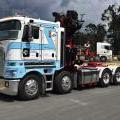North Coast Timber as an economic engine
 The overall economic picture of North Coast forestry stands out better than most resource uses. A quick overview of the process proves the point. First, we start with the trees. The process of photosynthesis used by trees is a very efficient use of sunlight, water, and carbon dioxide. Trees can quickly become self-sufficient (once they have grown past competition from weeds and animal damage). The financial benefits of owning timbered land can be yielded every 15-20 years if the landowner chooses to work with a forester making resource sustainability the highest priority. Forester jobs are professional positions and provide livable salaries. Next up are the loggers who get paid for harvesting the trees and skidding them to a central point. Up next is a trucker who will load and drive the logs to a sawmill and unload them there. After that we have a highly skilled sawyer who needs to maximize grade and yield of the logs while sawing. Next in line is a board grader whose keen eye can financially make or break a sawmill. The graded and dried timber is graded once more and then is sent to a secondary producer who will manufacture it into a finished product. These producers can sell the product out their front door or they can wholesale it to retailers who are able to reach a larger market. People can buy the material (cabinetry, flooring, siding, etc) at this time or contractors can purchase this material and bring it into peoples' homes where they will install it. For the full picture of some of the people involved in the North Coast Timber Economic Engine click on the following link Behind the trees
The overall economic picture of North Coast forestry stands out better than most resource uses. A quick overview of the process proves the point. First, we start with the trees. The process of photosynthesis used by trees is a very efficient use of sunlight, water, and carbon dioxide. Trees can quickly become self-sufficient (once they have grown past competition from weeds and animal damage). The financial benefits of owning timbered land can be yielded every 15-20 years if the landowner chooses to work with a forester making resource sustainability the highest priority. Forester jobs are professional positions and provide livable salaries. Next up are the loggers who get paid for harvesting the trees and skidding them to a central point. Up next is a trucker who will load and drive the logs to a sawmill and unload them there. After that we have a highly skilled sawyer who needs to maximize grade and yield of the logs while sawing. Next in line is a board grader whose keen eye can financially make or break a sawmill. The graded and dried timber is graded once more and then is sent to a secondary producer who will manufacture it into a finished product. These producers can sell the product out their front door or they can wholesale it to retailers who are able to reach a larger market. People can buy the material (cabinetry, flooring, siding, etc) at this time or contractors can purchase this material and bring it into peoples' homes where they will install it. For the full picture of some of the people involved in the North Coast Timber Economic Engine click on the following link Behind the trees
So you can see that those trees produced a lot of economic activity and we can do that renewably. And when the conservation benefits of forestry (clean air, clean water, water retention, animal habitat) are taken into account, forestry surpasses other sectors such as agriculture and tourism easily. This is not to say that we should be anti-tourism or anti-agriculture, but it does mean that forest landowners, foresters, and the forest industry should realize the true economics of forestry and never shy away from an honest discussion about those economic benefits to all of society.



